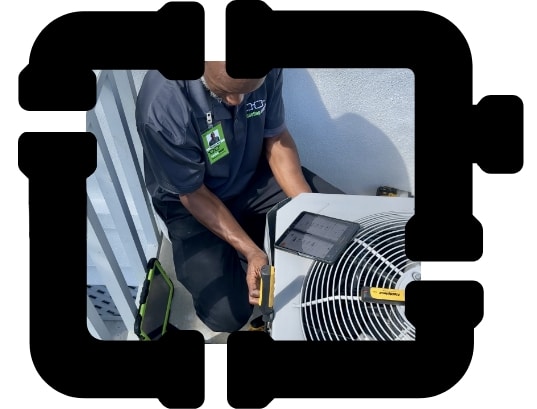If you’re wondering about the indoor air quality of your Fort Myers Beach home, call Plumbing, Cooling & Electrical Nerds today to request a quote and book a test from one of our air quality technicians.
Frequently Asked Questions
Why is indoor air quality important?
Indoor air quality is crucial because it directly affects your health and well-being. Poor air quality can lead to respiratory issues, allergies, and other health problems. It can also impact the comfort of your home by causing unpleasant odors and increasing the presence of dust and allergens. Ensuring good indoor air quality helps create a healthier and more comfortable living environment.
What are the common pollutants that affect indoor air quality?
Common indoor air pollutants include dust, pollen, pet dander, microbial growth spores, volatile organic compounds (VOCs) from household products, and chemicals from synthetic furniture and building materials. These contaminants can accumulate in the air, especially in well-sealed homes, and contribute to poor indoor air quality.
How does indoor air quality testing work?
Indoor air quality testing involves assessing the air in your home for various pollutants and contaminants. Technicians use specialized equipment to measure the levels of dust, pollen, microbial growth spores, VOCs, and other pollutants. The results help identify specific issues affecting your indoor air quality, allowing for targeted solutions to improve it.
What are the benefits of indoor air quality testing?
Indoor air quality testing provides valuable information about the pollutants present in your home. This knowledge helps you take appropriate actions to mitigate these issues, such as improving ventilation, using air purifiers, or cleaning ducts. Testing ensures that you address the specific problems affecting your indoor air quality, leading to a healthier and more comfortable living environment.
How often should I have my indoor air quality tested?
It’s a good idea to have your indoor air quality tested at least once a year, especially if you have household members with allergies or respiratory issues. Additionally, if you notice changes in air quality, such as unusual odors or increased dust, it’s wise to schedule a test. Regular testing helps maintain a healthy indoor environment by addressing any emerging issues promptly.
Can pets affect indoor air quality?
Yes, pets can significantly affect indoor air quality. Pet dander, hair, and saliva can contribute to allergens in the air, which may trigger allergies and respiratory issues. Regular grooming of pets, using air purifiers, and frequently cleaning your home can help mitigate the impact of pets on indoor air quality.
What solutions are available to improve indoor air quality?
Several solutions can improve indoor air quality, including air purifiers, high-efficiency particulate air (HEPA) filters, UV air sanitizers, and proper ventilation systems. Regular cleaning, maintaining your HVAC system, and addressing sources of pollutants, such as microbial growth or chemical off-gassing, are also important steps. Our technicians at Plumbing, Cooling & Electrical Nerds can recommend and install the best solutions for your home.
How can microbial growth and mildew affect indoor air quality?
Microbial growth and mildew release spores into the air, which can cause allergic reactions, respiratory problems, and other health issues. These spores can also create musty odors and contribute to overall poor indoor air quality. Identifying and addressing microbial growth and mildew issues promptly is essential to maintain a healthy indoor environment.
What role does ventilation play in indoor air quality?
Ventilation is crucial for maintaining good indoor air quality as it helps remove stale air and introduce fresh outdoor air. Proper ventilation reduces the concentration of indoor pollutants, regulates humidity levels, and prevents the buildup of contaminants. Ensuring your home has adequate ventilation can significantly improve indoor air quality.
What should I expect during an indoor air quality test?
During an indoor air quality test, a technician will visit your home and use specialized equipment to measure levels of various pollutants. The process may involve collecting air samples, inspecting your HVAC system, and assessing ventilation. After the test, you will receive a detailed report with the findings and recommendations for improving your indoor air quality based on the results.

